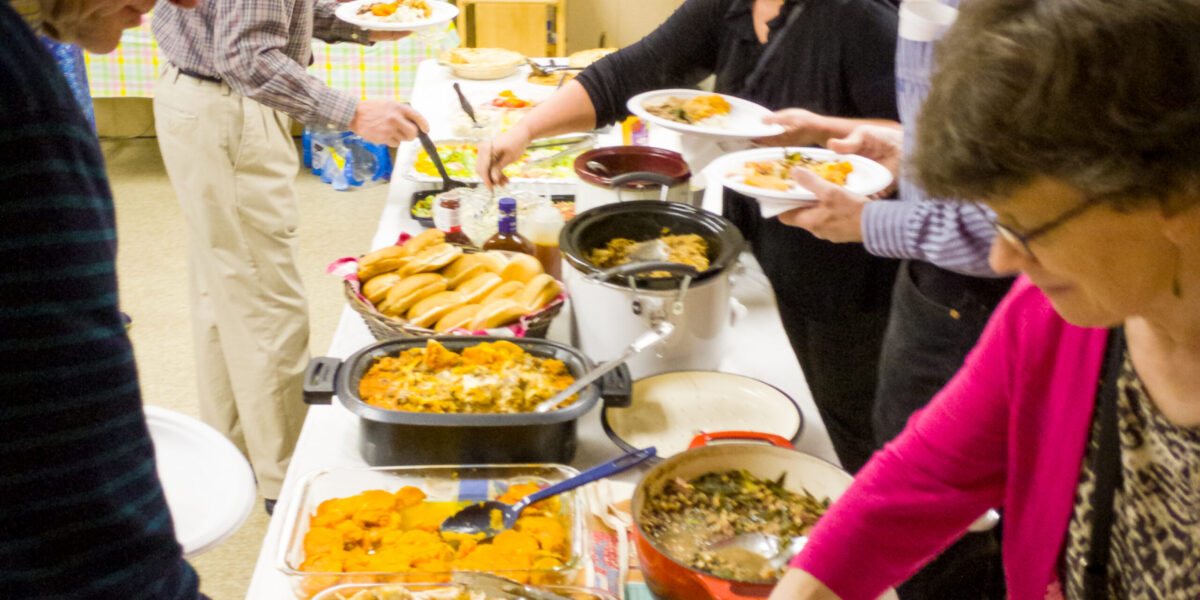Editor’s note: November is Mission Month, and Mennonite Mission Network is excited to provide sermon starters, worship materials and videos to help your church plan a Mission Sunday service. Learn how hospitality, this year’s theme, is shared through mission across the globe! The following story expands on a video and two recipes (brownies and dinner rolls) that are included in this year’s Mission Sunday materials. For more information on how your church can plan a Mission Sunday service, click here.
NEWTON, Kansas (Mennonite Mission Network) — For Open Door Mennonite Church in Jackson, Mississippi, the second Sunday of the month means potluck. Southern staples, like collard greens, cornbread, and red beans and rice (seasoned in a hog’s neck broth and served with sausage) are ushered into the building in baskets, bags and slow cookers.
The fellowship room, with chairs still arranged from the Sunday school that met earlier in the day, is awash in the smells and commotion of a congregation nourishing their bodies and souls together.
Even during the pandemic, when the congregation couldn’t meet in the church building, members still met in backyards after the virtual service to share in socially distanced meals.
"We’ve tried to take time to still fellowship and break bread together," said Horace McMillon, pastor at Open Door Mennonite Church, in a recent video interview. "Because relationships are something that are very important to us."
As the host congregation for the Jackson Service Adventure unit, the church has welcomed unit participants and leaders to these gatherings since the unit opened in 2016. One year, when the unit included participants with gluten and sugar allergies, the congregation realized that their potlucks had a problem: Nearly everything the congregants placed on the table each month was "off the table" for the participants.
The collard greens recipe called for sugar. The cornbread had wheat flour, and therefor wasn’t gluten-free. The sausage accompanying the red beans and rice contained a sugar preservative. Even the onions, in just about every savory dish, contained hearty amounts of naturally occurring sugar.
"The first couple Sundays, [the participants] would bring stuff to make sure they could eat," said Mark Roth, a member of Open Door, in a recent phone interview. However, it wasn’t long before the congregation made the decision that every dish that year would be gluten- and sugar-free, to enable the Service Adventure participants to eat whatever they wanted to from the serving table.
"We are an inclusive church in all aspects of life," said Roth. "And so, we want to make it a place where everybody feels comfortable to be at, whether you are somebody from the street or whether you’re somebody of great means, and so that filtered over into our fellowship meal."
Some recipes were easy to adapt. The wheat flour in cornbread was swapped out for a one-to-one gluten-free flour. Green beans, a vegetable low in natural sugar, became a side dish staple. Other dishes, especially desserts, proved to be more of a challenge. Brownies made with Stevia sweetener were "horrible," recalled Roth. A gluten- and sugar-free pound cake was "edible, but not very tasty." The textures of breads and rolls made with gluten-free flour were often too tough or hard. "It made cooking a challenge, but it made us get creative," said Roth.
Eventually, Roth and others in the congregation found a gluten-free flour from a local grocer that gave consistent baking results. The Service Adventure unit and the church bought an expensive one-to-one sugar substitute in bulk together and divided it up, enabling everyone to make sugar-free sweets. Follow these links for Roth’s go-to recipes for gluten- and sugar-free brownies and dinner rolls.

Arloa Bontrager, Erika Kreider, Merlin Grieser, Horace McMillon and Barry Kreider talk after a Sunday potluck lunch at Open Door Mennonite Church in Jackson, Mississippi, on March 8, 2020. Photo by Travis Duerksen.
Open Door was founded in 1992 as an intentionally multicultural church, when very few congregations were racially diverse in Jackson, said McMillon. "That was still one of those cultural fault lines that people were very uncomfortable with," he recalled. "So, the whole idea of accommodating people from different walks of life, different backgrounds, that’s always been part of what hospitality means at Open Door."
The church-wide dietary restrictions, however, added a new dimension to the congregations’ view of hospitality. Before the Service Adventure participants with gluten and sugar allergies arrived, Roth said, the congregation had never coordinated who was bringing what food to the potluck.
"You just cooked what you wanted to cook and never thought of allergies," he said. "It was very helpful for us, as a church, in our quest to be inclusive, [to be shown] that food allergies are just as important as other issues."








